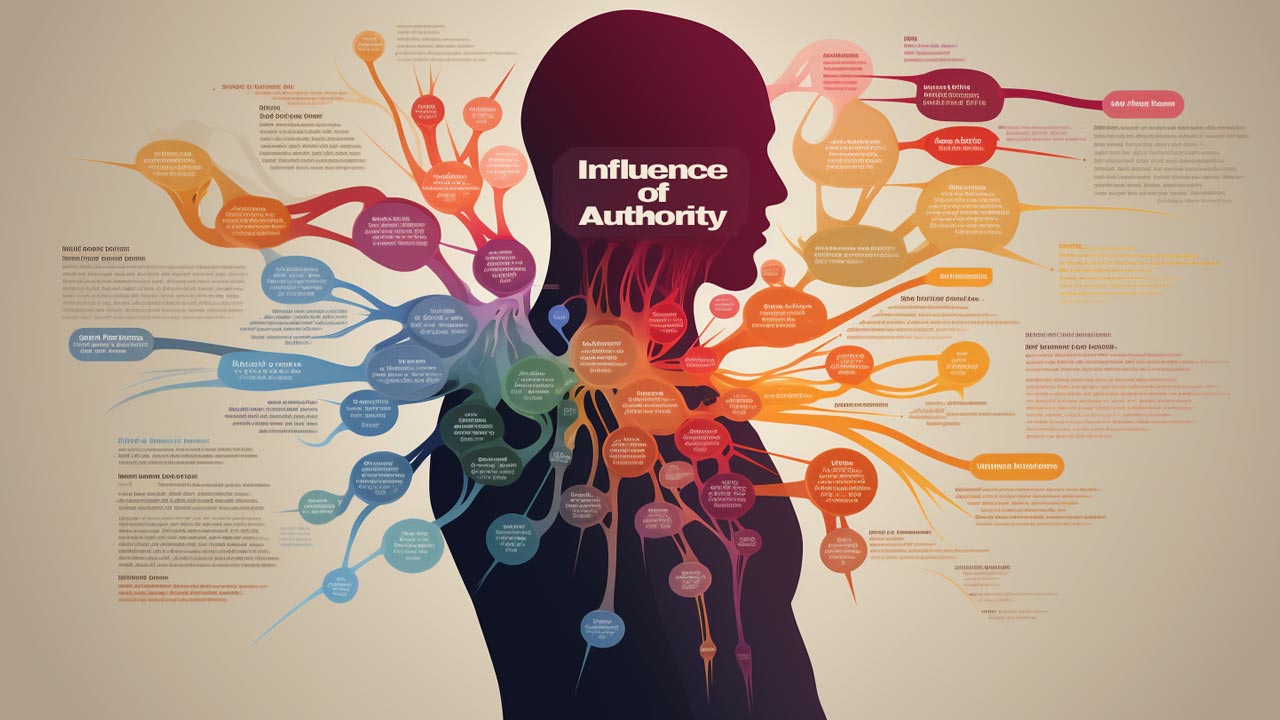If you’d like to start this series from the beginning, start with The Power of Persuasion Part 1
The Power of Persuasion Part 4. Influence of Authority
The influence of authority is a powerful psychological principle that explores how individuals are inclined to comply with the directives or requests of authority figures. Authority figures are perceived as possessing expertise, knowledge, or legitimate power, which leads people to follow their instructions or advice. Understanding the dynamics of authority influence is essential in various fields, including leadership, education, and marketing. Let’s explore each aspect in detail:
Table of Contents
- Introduction to the Influence of Authority
- Milgram Experiment
- Stanford Prison Experiment
- Factors Contributing to Authority Influence
- Obedience to Authority
- Influence of Authority in Education
- Influence of Authority in Organizations
- Authority in Marketing and Advertising
- The Dark Side of Authority
- Resisting Unethical Authority Influence
- Ethical Considerations
- Case Studies and Real-World Examples
- Frequently Asked Questions
- Final Thoughts
- Sources
Introduction to the Influence of Authority
Defining Authority
The influence of authority is a cornerstone concept in sociology and psychology, pivotal in understanding how individuals and groups behave within structured societies. Authority refers to the power or right, perceived or legitimate, to give orders, make decisions, and enforce obedience. It is a form of social influence recognized and accepted by those who are subject to it.
Types of Authority
- Legitimate Authority: This type stems from a position of power in a formal organization or hierarchy, like a police officer or a company CEO.
- Expert Authority: Here, influence is drawn from knowledge or expertise in a specific area. For example, a doctor making health recommendations.
- Referent Authority: This is based on charisma and the personal appeal of an individual. Charismatic leaders or celebrities often possess this form of authority.
Authority’s Role in Social Structure
- Organizational Functioning: In organizations, authority ensures efficient functioning through a clear hierarchy and decision-making process.
- Social Order: Authority plays a crucial role in maintaining social order, evident in legal and governmental systems.
- Cultural Influence: The perception and acceptance of authority can vary significantly across different cultures and societal structures.
Psychology of Obedience to Authority
- The Milgram Experiment: Stanley Milgram’s landmark study demonstrated how people are willing to obey authority figures, even when asked to perform acts conflicting with their personal conscience.
- Influencing Factors: The likelihood of obedience increases with the perceived legitimacy of the authority figure, physical proximity, and the absolution of responsibility.
Authority and Ethics
- Ethical Use of Authority: The ethical application of authority involves respecting the rights and dignity of those under it and avoiding abuse of power.
- Challenging Unethical Authority: History shows the importance of questioning and challenging authority when it becomes oppressive or unjust.
Authority in Everyday Life
- Workplace Dynamics: Authority shapes workplace cultures, influencing everything from decision-making processes to employee behavior.
- Family and Education: In families and educational institutions, authority figures play a significant role in guiding and teaching younger or less experienced individuals.
The influence of authority is an integral part of social interactions and organizational structures. It can be a powerful force for order and stability, but also carries the potential for abuse and oppression. Understanding the dynamics of authority, its types, and how it impacts behavior and decision-making is crucial for navigating various social and professional environments. This understanding also underscores the importance of ethical leadership and the responsible exercise of power in all areas of society.
Milgram Experiment: A Landmark Study in Obedience to Authority
Background and Context
- Development: The Milgram Experiment was developed by Yale University psychologist Stanley Milgram in the early 1960s. It was partly inspired by the trial of Adolf Eichmann, a Nazi war criminal, and the wider question of how ordinary people could be persuaded to carry out horrific acts during the Holocaust.
- Objective: The primary aim was to test the extent to which individuals would obey authority figures, even when the orders given were morally questionable or caused harm to others.
The Experiment Setup
- Participants: The participants, who were ordinary people, were told that they were part of a learning experiment involving punishment in the form of electric shocks.
- Roles: Each session involved three roles – the Experimenter (authority figure), the Teacher (participant), and the Learner (an actor).
- Procedure: The Teacher was instructed to administer increasingly severe electric shocks to the Learner whenever an incorrect answer was given in a memory test. The shocks were not real, but the Teacher was led to believe they were.
Findings and Observations
- Obedience Levels: A significant majority of participants (65%) administered the experiment’s highest shock level, despite the apparent distress of the Learner.
- Psychological Conflict: Many participants showed signs of distress and hesitation, yet continued to follow orders.
- Influence of Authority: The presence and insistence of the Experimenter were key factors in the participants’ willingness to continue delivering shocks.
Implications and Controversies
- Human Nature and Authority: The experiment revealed disturbing insights into human nature, particularly our capacity to obey authority figures even against our moral judgments.
- Ethical Concerns: The experiment was criticized for its deceptive nature and the emotional distress caused to participants. It led to changes in how psychological experiments are ethically conducted and reviewed.
Variations and Replications
- Subsequent Experiments: Milgram conducted several variations of the experiment, altering factors like the proximity of the Teacher to the Learner and the location of the experiment.
- Modern Replications: More recent replications have generally confirmed Milgram’s findings, although with somewhat lower levels of obedience.
Legacy
- Psychology and Society: The Milgram Experiment remains a fundamental study in social psychology, offering insights into human behavior, particularly regarding obedience to authority and the power of situational factors over individual personality traits.
- Educational Impact: It has become a staple topic in psychology education, often used to discuss ethical standards in psychological research and the complexities of human obedience and moral decision-making.
The Milgram Experiment fundamentally challenged our understanding of obedience and ethical behavior. It serves as a powerful reminder of the influence of authority and the conditions under which individuals may act against their ethical beliefs. This knowledge continues to inform and shape discussions in psychology, ethics, and beyond.
Stanford Prison Experiment: An Exploration of Power Dynamics
Background and Context
- Development: The Stanford Prison Experiment was conducted in 1971 by psychologist Philip Zimbardo at Stanford University. It was designed to investigate how perceived power in a simulated prison environment could influence behavior.
- Objective: The primary aim was to understand the psychological effects of becoming a prisoner or prison guard and to study how situational factors could override individual personality traits in shaping behavior.
The Experiment Setup
- Participants: Volunteer male college students were recruited and randomly assigned roles as either ‘guards’ or ‘prisoners’.
- Environment: The basement of the Stanford psychology building was converted into a mock prison, and participants were instructed to act out their roles.
- Duration: Originally planned for two weeks, the experiment was terminated after only six days due to the extreme and distressing behavior exhibited.
Findings and Observations
- Behavioral Changes: The ‘guards’ quickly began to display authoritarian and abusive behavior, while the ‘prisoners’ showed signs of severe distress and passivity.
- Absorption of Roles: Both guards and prisoners rapidly internalized their roles. The guards enforced arbitrary rules and punishments, and the prisoners began to show signs of extreme stress and hopelessness.
- Loss of Identity: Individual identities were quickly lost, as participants conformed to their assigned roles, leading to dehumanizing behavior, especially among the guards.
Implications and Controversies
- Power and Authority: The experiment highlighted the ease with which ordinary individuals could engage in cruel behavior when placed in a position of power within a structured environment.
- Ethical Issues: The Stanford Prison Experiment faced significant ethical scrutiny due to the mental and emotional distress experienced by participants. It raised questions about the ethical limits of psychological experimentation.
- Criticism of Methodology: Critics have pointed out flaws in the experiment’s design, including potential experimenter bias (Zimbardo himself played the role of prison superintendent) and the influence of participant expectations on behavior.
Legacy and Relevance
- Influence on Psychology: The experiment is a landmark in social psychology, illustrating the power of situational forces over individual character in certain contexts.
- Application in Other Fields: Its findings have been influential in various fields, including criminal justice, military training, and understanding group behavior.
- Educational Impact: The Stanford Prison Experiment is widely taught in psychology courses as a lesson in the ethical conduct of research and the complex dynamics of power and authority.
The Stanford Prison Experiment remains one of the most famous and controversial studies in social psychology. It serves as a stark reminder of the capacity for situational factors to influence human behavior, often in unexpected and distressing ways. The experiment continues to be a reference point for discussions on ethics, human nature, and the psychology of power and authority.
Factors Contributing to Authority Influence
Introduction
The influence of authority figures in shaping individual and group behavior is a fundamental aspect of social dynamics. Various factors contribute to how and why people are influenced by authority. Understanding these factors is essential in fields ranging from organizational behavior to social psychology.
1. Legitimacy of Authority
- Perceived Right to Lead: If an individual or institution is perceived as having a legitimate right to lead or command, people are more likely to comply with their directives.
- Cultural and Societal Norms: Different cultures have varying levels of deference to authority, often based on historical, social, and legal norms.
2. Expertise and Knowledge
- Perceived Expertise: Authority figures who are perceived to have high levels of expertise or knowledge in a specific area can exert significant influence.
- Credibility: The credibility of an authority figure, often established through credentials, experience, or demonstrated skill, enhances their ability to influence.
3. Role and Position
- Formal Positions: Individuals in formal positions of authority, such as managers, military officers, or teachers, inherently possess a degree of influence due to their roles.
- Symbolic Authority: The symbols of authority (e.g., uniforms, titles, or office settings) can increase the perception of authority and, consequently, its influence.
4. Charisma and Personality Traits
- Charismatic Authority: Personal charisma can significantly enhance an individual’s authority. Charismatic leaders often inspire and motivate others more effectively.
- Personality Traits: Traits such as confidence, assertiveness, and the ability to communicate effectively can augment a person’s authoritative influence.
5. Socialization and Conditioning
- Early Socialization: Respect for and obedience to authority is often ingrained through early socialization in family, educational institutions, and societal structures.
- Conditioning: Over time, individuals may be conditioned to respond to authority in certain ways, depending on their experiences and upbringing.
6. Reward and Punishment Systems
- Control of Resources: Authority figures often control access to resources, rewards, and punishments, influencing behaviors through these mechanisms.
- Reinforcement: The use of rewards and punishments can reinforce the authority figure’s influence and control.
7. Group Dynamics and Peer Influence
- Group Pressure: In a group setting, if the majority respects and follows an authority figure, it can create pressure on all members to conform.
- Social Proof: Observing others complying with authority can serve as social proof, leading individuals to follow suit.
8. Fear and Intimidation
- Fear of Consequences: The fear of negative consequences, such as losing a job or facing legal repercussions, can be a powerful motivator in obeying authority.
- Intimidation: The use of intimidating behavior or language can reinforce authority, though this can lead to negative outcomes like resentment or rebellion.
The influence of authority is multifaceted and deeply embedded in social and organizational structures. While it can be a force for good, guiding and organizing activities, it can also be abused. Understanding the factors that contribute to authority’s influence is vital in developing fair, ethical, and effective leadership and governance models.
Obedience to Authority: Understanding Compliance in Social Contexts
Introduction
Obedience to authority is a fundamental aspect of social behavior. It involves compliance with commands or instructions from an authority figure, often overriding personal beliefs or moral judgments. This phenomenon is crucial for understanding group dynamics, organizational functioning, and societal order.
The Nature of Obedience
- Definition: Obedience is the act of following the directives of an authority figure, typically in a hierarchy or structured setting.
- Distinguishing from Conformity: Unlike conformity, which is influenced by peer pressure, obedience specifically involves a response to an authority figure.
Psychological Foundations
- Authority as a Social Construct: The concept of authority is deeply ingrained in social structures, and the inclination to obey is often rooted in cultural and social norms.
- Socialization Process: From an early age, individuals are socialized to respect and obey authority figures, such as parents, teachers, and law enforcement.
Factors Influencing Obedience
- Legitimacy of Authority: The perceived legitimacy of the authority figure significantly affects the degree of obedience.
- Proximity of Authority: Physical or psychological closeness to the authority figure can increase obedience levels.
- Diffusion of Responsibility: When individuals feel that the authority figure will bear the responsibility for their actions, they are more likely to comply.
- Perceived Expertise: Authority figures perceived as experts are more likely to be obeyed.
- Cultural Factors: Cultural backgrounds that emphasize respect for authority tend to have higher levels of obedience.
Famous Studies and Experiments
- The Milgram Experiment: Stanley Milgram’s experiment demonstrated that individuals could obey authority figures to the extent of inflicting harm on others.
- Zimbardo’s Stanford Prison Experiment: Though controversial, this study showed how quickly people could conform to roles of authority and subordination in a simulated prison environment.
Implications of Obedience
- Maintaining Social Order: Obedience to authority is essential for maintaining societal structures and ensuring the functioning of various systems.
- Potential for Abuse: Excessive obedience, especially in the absence of moral judgment, can lead to unethical or harmful actions.
- Leadership and Management: Understanding obedience dynamics is crucial for effective leadership and organizational management.
Obedience and Ethical Considerations
- Ethical Leadership: Leaders have a responsibility to ensure that their commands and expectations are ethical and just.
- Critical Thinking: Encouraging critical thinking and moral reasoning can help individuals make better decisions about when to obey or question authority.
Obedience to authority plays a critical role in social order and cohesion. While it facilitates the functioning of organizations and societies, it also poses ethical challenges and risks. Understanding the mechanisms and factors influencing obedience is essential for ethical leadership, informed citizenship, and the development of a just society.
Influence of Authority in Education
Introduction
The influence of authority in education is a fundamental aspect that shapes learning environments, teacher-student dynamics, and educational outcomes. Authority in education is not just about maintaining order; it’s about fostering an environment conducive to learning and personal development.
Types of Authority in Educational Settings
- Legitimate Authority: Based on the teacher’s role and position within the educational system.
- Expert Authority: Stemming from the teacher’s knowledge and expertise in their subject matter.
- Referent Authority: Coming from the teacher’s ability to build rapport, showing care and concern for students.
The Role of Authority in Learning
- Creating a Structured Environment: Authority helps establish a structured environment where learning objectives can be effectively met.
- Guiding Student Behavior: Proper use of authority guides students in understanding acceptable behaviors and attitudes conducive to a learning environment.
- Facilitating Classroom Management: Effective exercise of authority is crucial for managing diverse classroom dynamics and ensuring that educational needs are met.
Balancing Authority and Autonomy
- Encouraging Independent Thinking: While maintaining authority, educators also need to encourage independent thought and creativity among students.
- Student-Centered Learning: Modern educational paradigms often focus on student-centered learning, where the teacher’s role is more of a facilitator than a dictator of knowledge.
Challenges in Exercising Authority
- Cultural and Social Dynamics: Teachers must navigate various cultural and social dynamics that influence how authority is perceived and respected.
- Changing Student-Teacher Dynamics: In the digital age, where information is readily accessible, the traditional dynamics of teacher-student authority are evolving.
- Discipline and Respect: Striking a balance between discipline and respect is a key challenge in exercising authority in the classroom.
Impact of Authority on Educational Outcomes
- Positive Outcomes: When effectively utilized, authority can lead to a disciplined learning environment, respect for educators, and successful knowledge transfer.
- Negative Outcomes: Misuse or overuse of authority can lead to a stifling classroom atmosphere, lack of engagement, and diminished critical thinking skills.
Ethical Considerations
- Respect for Students: Authority should be exercised with a fundamental respect for student dignity and individuality.
- Avoiding Authoritarianism: An authoritarian approach can be detrimental to student morale and inhibit open communication.
The Evolving Nature of Authority in Education
- Technology and Authority: The rise of technology in education is changing traditional authority structures, with more collaborative and interactive learning models.
- Lifelong Learning: In the context of lifelong learning, authority becomes a guide and resource rather than a directive force.
The influence of authority in education is a delicate balance that requires careful consideration and adaptability. Effective educational authority respects students’ individuality, fosters an environment of mutual respect and learning, and adapts to the evolving educational landscapes. By appropriately wielding authority, educators can profoundly impact their students’ academic success and personal growth.
Influence of Authority in Organizations
Introduction
The influence of authority within organizations is a critical element in shaping workplace culture, employee behavior, and organizational effectiveness. Authority in this context refers to the legitimate power of organizational leaders, managers, or supervisors to direct employee actions and make crucial decisions.
Types of Authority in Organizations
- Positional Authority: Stemming from one’s designated role within the organizational hierarchy, such as a manager or team leader.
- Expert Authority: Based on specialized knowledge or expertise that an individual possesses, often influencing others regardless of their formal position.
- Charismatic Authority: Deriving from an individual’s personal qualities or charismatic traits that naturally encourage others to follow their lead.
The Role of Authority in Organizational Functioning
- Guiding and Directing Employees: Authority figures provide direction and guidance, helping employees understand their roles and responsibilities.
- Decision-Making: Those in positions of authority are often responsible for making key decisions that affect the organization’s direction and success.
- Conflict Resolution: Authority is crucial in resolving conflicts and ensuring a harmonious working environment.
Balancing Authority and Employee Autonomy
- Empowering Employees: Modern organizational practices emphasize the importance of empowering employees, giving them autonomy and encouraging independent decision-making.
- Participative Management: This approach involves sharing decision-making powers with employees, promoting a more democratic and inclusive workplace.
Challenges in Exercising Authority
- Maintaining Respect and Trust: Exercising authority without losing the respect and trust of employees is a delicate balance.
- Avoiding Abuse of Power: There is always a risk of authority being misused, leading to a toxic workplace environment.
- Adapting to Changing Work Cultures: With evolving work cultures, especially with remote and diverse workforces, the traditional exercise of authority may need reevaluation.
Impact of Authority on Organizational Culture
- Positive Impact: Well-exercised authority can lead to a productive, efficient, and motivated workforce, and can foster a positive organizational culture.
- Negative Impact: Misuse or over-reliance on authority can lead to employee dissatisfaction, decreased motivation, and a negative work environment.
Ethical Considerations in Exercising Authority
- Fairness and Equity: Authority should be exercised with a commitment to fairness and equity, ensuring that all employees are treated justly.
- Transparency: Decisions made by those in authority should be transparent and accountable.
The Evolving Nature of Authority in Organizations
- Shift Towards Collaborative Leadership: There’s a growing trend towards more collaborative and less hierarchical leadership styles in many modern organizations.
- Empowering Leadership Models: Models like servant leadership emphasize the role of leaders in serving their teams, inverting traditional authority dynamics.
The influence of authority in organizations is multifaceted and evolving. Effective organizational leadership requires a nuanced understanding of how to wield authority responsibly while fostering an environment of empowerment, collaboration, and mutual respect. Balancing authority with empathy and ethical considerations is key to cultivating a positive and productive organizational culture.
Authority in Marketing and Advertising
Introduction
In the realm of marketing and advertising, the concept of authority plays a crucial role in influencing consumer behavior and brand perception. Authority in this context often revolves around using expertise, credibility, and trust to persuade consumers and shape their purchasing decisions.
Types of Authority in Marketing
- Brand Authority: Established through a brand’s reputation for quality, reliability, and expertise in a particular industry or product category.
- Expert Endorsements: Utilizing recognized experts or industry leaders to endorse products, lending credibility and authority to the brand.
- Influencer Authority: Leveraging the influence of social media personalities who have built trust and authority within their follower base.
Role of Authority in Consumer Decision-Making
- Building Trust: Authority helps in building trust with potential customers, which is essential in a consumer’s decision to purchase a product or service.
- Influencing Perceptions: The authority associated with a brand or product can significantly influence how consumers perceive its value and effectiveness.
Strategies for Establishing Authority in Marketing
- Content Marketing: Providing valuable, informative content can establish a brand as an authority in its field.
- Testimonials and Reviews: Showcasing customer testimonials and expert reviews can lend authority and credibility to a product.
- Certifications and Awards: Displaying industry certifications, awards, or ratings can enhance a brand’s authoritative image.
Challenges and Ethical Considerations
- Authenticity vs. Manipulation: Balancing authoritative marketing with authenticity is crucial. Over-reliance on authority or misleading claims can lead to consumer distrust.
- Transparency: Being transparent about sponsorships and endorsements is essential to maintain ethical standards in marketing.
Authority in Digital Marketing
- SEO and Online Authority: In digital marketing, authority also pertains to a website’s credibility and rank in search engine results, often achieved through quality content and backlinks.
- Social Media Influence: Brands often collaborate with social media influencers to tap into their authority with specific audiences.
Impact of Authority on Brand Loyalty
- Long-term Relationships: Brands that successfully establish authority often enjoy long-term relationships with their customers, leading to higher brand loyalty and advocacy.
- Competitive Advantage: Authority can be a key differentiating factor in competitive markets, helping brands stand out.
Authority in Advertising Campaigns
- Celebrity Endorsements: Celebrities often bring an authoritative presence to advertising campaigns, influencing consumer attitudes and behaviors.
- Expert-driven Campaigns: Campaigns featuring experts, like doctors for healthcare products, can enhance the perceived reliability and trustworthiness of a brand.
Authority in marketing and advertising is a powerful tool for influencing consumer behavior, building brand trust, and driving purchasing decisions. It must, however, be wielded with a balance of ethical responsibility, authenticity, and a genuine commitment to offering value to consumers. In an increasingly skeptical consumer market, the authoritative voice of a brand can be a critical factor in establishing lasting consumer relationships and driving business success.
The Dark Side of Authority
Introduction
While authority is essential for social order and organizational efficiency, it has a darker aspect that can lead to abuse of power, oppressive behaviors, and unethical decision-making. Understanding the dark side of authority is crucial to prevent misuse and its harmful consequences.
Abuse of Power
- Exploitation: Individuals in positions of authority might exploit their power for personal gain, often at the expense of those they lead or represent.
- Manipulation: Authority can be used to manipulate or coerce others into actions that are not in their best interest.
Authoritarian Leadership
- Dictatorial Control: In some cases, authority figures may exhibit controlling, rigid, and dictatorial behaviors, stifling creativity and autonomy.
- Suppression of Dissent: Authoritarian leaders often suppress dissenting opinions, leading to a culture of fear and compliance rather than open communication.
Consequences of Excessive Authority
- Loss of Morale and Trust: Abuse of authority can lead to a loss of morale, trust, and respect among subordinates or the general populace.
- Ethical Breaches: Excessive authority can lead to ethical breaches, where decisions are made that violate moral or ethical standards.
Psychological Impact
- Impact on Subordinates: Individuals subjected to abusive authority may experience stress, anxiety, and a sense of helplessness.
- Dehumanization: In extreme cases, such as in oppressive regimes or corrupt institutions, the dehumanization of individuals can occur.
Organizational Culture
- Toxic Environments: A misuse of authority can create toxic work environments, characterized by fear, resentment, and low employee engagement.
- Groupthink: Excessive respect for authority in organizations can lead to groupthink, where critical thinking and individual responsibility are diminished.
Historical Examples
- Political Regimes: Authoritarian political regimes often demonstrate the dark side of authority, where power is used oppressively, leading to human rights violations.
- Corporate Scandals: In the corporate world, CEOs or leaders abusing their authority have led to scandals and organizational collapses.
Preventing the Dark Side of Authority
- Checks and Balances: Implementing checks and balances in systems of power can help prevent the abuse of authority.
- Ethical Leadership Training: Training leaders in ethical decision-making and empathy can mitigate the risks of authority abuse.
- Whistleblower Protections: Encouraging and protecting whistleblowers can help identify and address abuses of power.
The dark side of authority serves as a reminder of the potential for power to corrupt and the importance of ethical, empathetic leadership. It underscores the need for accountability mechanisms, ethical standards, and a culture that values transparency and open dialogue. By recognizing and addressing the potential negative aspects of authority, organizations, societies, and individuals can work towards more just, equitable, and healthy environments.
Resisting Unethical Authority Influence
Introduction
Resisting unethical authority is a significant challenge, requiring courage, awareness, and a strong ethical compass. In many instances, individuals and groups find themselves compelled to stand against authority figures who misuse power or engage in unethical behavior.
Understanding Unethical Authority
- Characteristics: Unethical authority may involve the misuse of power, manipulation, exploitation, discrimination, or any actions that compromise ethical standards and the well-being of others.
- Manifestations: It can manifest in various forms, from workplace harassment and corruption to authoritarian political regimes.
Strategies for Resistance
- Awareness and Education: Being educated about one’s rights and the ethical standards expected in different contexts is crucial for recognizing and resisting unethical authority.
- Cultivating Moral Courage: Developing the courage to stand up against unethical practices, despite potential risks or consequences, is essential for effective resistance.
- Building Support Networks: Creating or joining support networks provides collective strength and resources for individuals who resist unethical authority.
- Whistleblowing: Exposing unethical behavior through appropriate channels can be an effective way of resisting authority. It’s important to ensure that whistleblowers have protections.
- Assertive Communication: Learning to communicate concerns and objections assertively and respectfully can help in challenging unethical decisions or actions.
Legal and Institutional Support
- Laws and Regulations: Familiarity with relevant laws and regulations can empower individuals to legally challenge unethical authority.
- Organizational Policies: Leveraging organizational policies and ethics committees can provide a framework for addressing unethical behavior in professional settings.
Ethical Leadership and Culture
- Promoting Ethical Leadership: Organizations and societies benefit from promoting leaders who demonstrate ethical behavior and decision-making.
- Creating an Ethical Culture: Cultivating a culture that values ethics, transparency, and accountability can discourage the emergence of unethical authority.
Challenges in Resisting
- Fear of Retribution: Fear of losing one’s job, status, or facing social ostracization can deter individuals from standing up against unethical authority.
- Psychological Stress: Resisting authority can be psychologically stressful, requiring emotional support and resilience.
Historical and Contemporary Examples
- Civil Rights Movements: History is replete with examples, such as civil rights movements, where individuals and groups have resisted unethical authority to bring about social change.
- Corporate Whistleblowers: In the corporate world, whistleblowers have played a pivotal role in exposing fraud and corruption.
Resisting unethical authority is a complex and often daunting task, but it is essential for maintaining ethical standards and protecting the well-being of individuals and communities. Through education, ethical leadership, supportive networks, and the courage to speak out, it is possible to stand against and effect change against unethical practices and authority figures.
Ethical Considerations in Authority and Influence
Introduction
Ethical considerations are paramount when dealing with authority and influence, whether in organizations, society, or interpersonal relationships. The ethical use of authority and influence involves balancing power with responsibility, ensuring that actions and decisions are fair, transparent, and respect the rights and dignity of all individuals involved.
Principles Guiding Ethical Authority and Influence
- Respect for Autonomy: Ethical authority respects the autonomy and freedom of individuals, allowing them to make informed decisions without coercion or manipulation.
- Justice and Fairness: Decisions and actions should be fair, impartial, and just, avoiding discrimination and favoritism.
- Transparency and Accountability: Ethical influence requires transparency in motives and methods and accountability for decisions and their consequences.
- Beneficence and Nonmaleficence: Authority should be exercised with the intention to do good and avoid harm, ensuring the welfare of those affected by decisions.
Challenges in Ethical Decision-Making
- Conflict of Interest: Authority figures often face conflicts between personal interests and their duty to act in the best interest of others.
- Power Dynamics: Navigating power dynamics ethically requires awareness of how authority can impact judgment and behavior.
Ethical Leadership
- Role Modeling: Leaders have a responsibility to model ethical behavior, setting a standard for others to follow.
- Creating an Ethical Culture: Promoting an organizational culture that values ethical behavior and encourages speaking out against unethical practices is crucial.
Ethical Use of Influence in Marketing and Advertising
- Honesty in Communication: Marketing efforts should be truthful, avoiding misleading or deceptive claims.
- Respecting Consumer Autonomy: Marketing strategies should respect consumer autonomy, providing them with the necessary information to make informed choices.
Resisting Unethical Authority
- Whistleblowing Protections: Protecting individuals who expose unethical practices from retaliation is essential in promoting ethical behavior.
- Encouraging Moral Courage: Fostering an environment where individuals feel empowered to challenge unethical decisions or actions is critical.
Ethical Considerations in Research and Academia
- Informed Consent: In research, obtaining informed consent from participants, ensuring they are fully aware of the research’s nature and any risks involved, is a key ethical requirement.
- Academic Integrity: In academia, upholding principles of academic integrity, such as honesty and fairness, is fundamental.
Ethical considerations in the exercise of authority and influence are integral to maintaining trust, integrity, and respect in any relationship or organization. It involves a conscious effort to act with fairness, transparency, and respect for the rights and welfare of others. Ethical leadership and decision-making create a foundation for positive and constructive relationships and organizational cultures.
Case Studies and Real-World Examples
1. Case Study: Enron Scandal
- Background: Enron, once a giant in the energy sector, collapsed in 2001 due to widespread corporate fraud and corruption.
- Ethical Breaches: Top executives abused their authority, engaging in unethical accounting practices to hide debt and inflate profits.
- Lesson: This case underscores the importance of ethical leadership and transparent financial practices. It led to significant changes in corporate governance and accounting standards (e.g., Sarbanes-Oxley Act).
2. Real-World Example: Google’s Ethical AI Development
- Background: Google, as a leader in AI, faces ethical challenges in developing and deploying AI technology.
- Ethical Approach: Google has established ethical guidelines for AI development, focusing on fairness, transparency, and avoiding harm, demonstrating how authority in technology can be exercised responsibly.
- Outcome: These efforts aim to prevent biases in AI algorithms and ensure they’re used for societal benefit.
3. Case Study: Volkswagen Emissions Scandal
- Background: In 2015, Volkswagen was found to have cheated on emissions tests for millions of its diesel-engine vehicles.
- Ethical Violation: The company’s leadership authorized the use of software to manipulate emissions data, misleading regulators and consumers.
- Impact: This scandal highlighted the need for ethical compliance in corporate practices, leading to significant legal consequences and reputation damage for Volkswagen.
4. Real-World Example: Whistleblowing in the Financial Sector
- Background: Whistleblowers have played key roles in exposing unethical practices in the financial industry, such as in the 2008 financial crisis.
- Ethical Action: Individuals within organizations came forward to reveal fraudulent activities, facing personal and professional risks.
- Significance: These cases underline the importance of ethical courage and the need for protective mechanisms for whistleblowers.
5. Case Study: The Tuskegee Syphilis Study
- Background: From 1932 to 1972, the U.S. Public Health Service conducted a study on the natural progression of untreated syphilis in African American men without their informed consent.
- Ethical Violation: The study was marked by major ethical breaches, including deception, lack of informed consent, and withholding of treatment.
- Consequences: This notorious study led to major changes in medical and research ethics, particularly in regards to informed consent and non-exploitative practices.
6. Real-World Example: Leadership during the COVID-19 Pandemic
- Context: The global pandemic posed unique ethical challenges for leaders in government and healthcare.
- Ethical Leadership: Effective leaders balanced public health concerns with individual rights, communicated transparently, and made evidence-based decisions.
- Learning: The pandemic highlighted the critical role of ethical leadership in crisis management and public health policy.
Conclusion
These case studies and examples demonstrate the profound impact that ethical considerations have in various fields, from corporate governance and technology to healthcare and public policy. They illustrate the importance of ethical leadership, transparency, and accountability, as well as the consequences of ethical violations. Learning from these instances helps in fostering a more responsible and ethical approach to authority and influence in all sectors.
Frequently Asked Questions
Final Thoughts
The human mind’s susceptibility to influence is a complex interplay of psychological, sociological, and neurological factors. Acknowledging these vulnerabilities empowers individuals to make informed decisions, resist manipulation, and cultivate critical thinking. By recognizing the power of persuasion, understanding cognitive biases, and fostering resilience, we can become more discerning consumers of information and active participants in society.
Continue Reading The Power of Persuasion: Part 5. Media and Advertising
Sources
- Cialdini, R. B. (2009). Influence: Science and practice. Pearson.
- Kahneman, D. (2011). Thinking, fast and slow. Farrar, Straus, and Giroux.
- Asch, S. E. (1955). Opinions and social pressure. Scientific American, 193(5), 31-35.
- Milgram, S. (1963). Behavioral study of obedience. Journal of Abnormal and Social Psychology, 67(4), 371-378.
- Kardes, F. R., Cronley, M. L., & Cline, T. W. (2011). Consumer behavior. Cengage Learning.









Leave A Comment